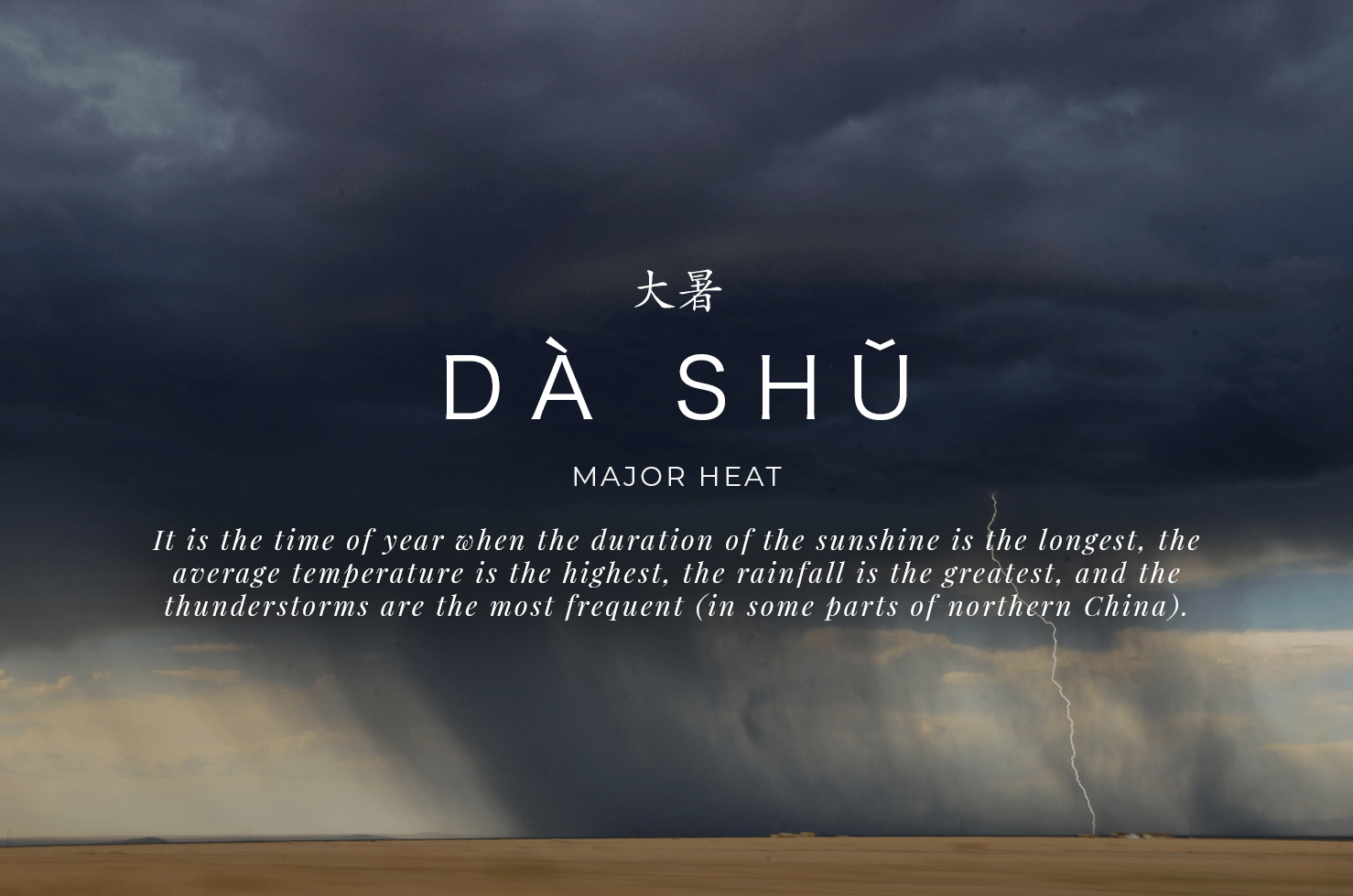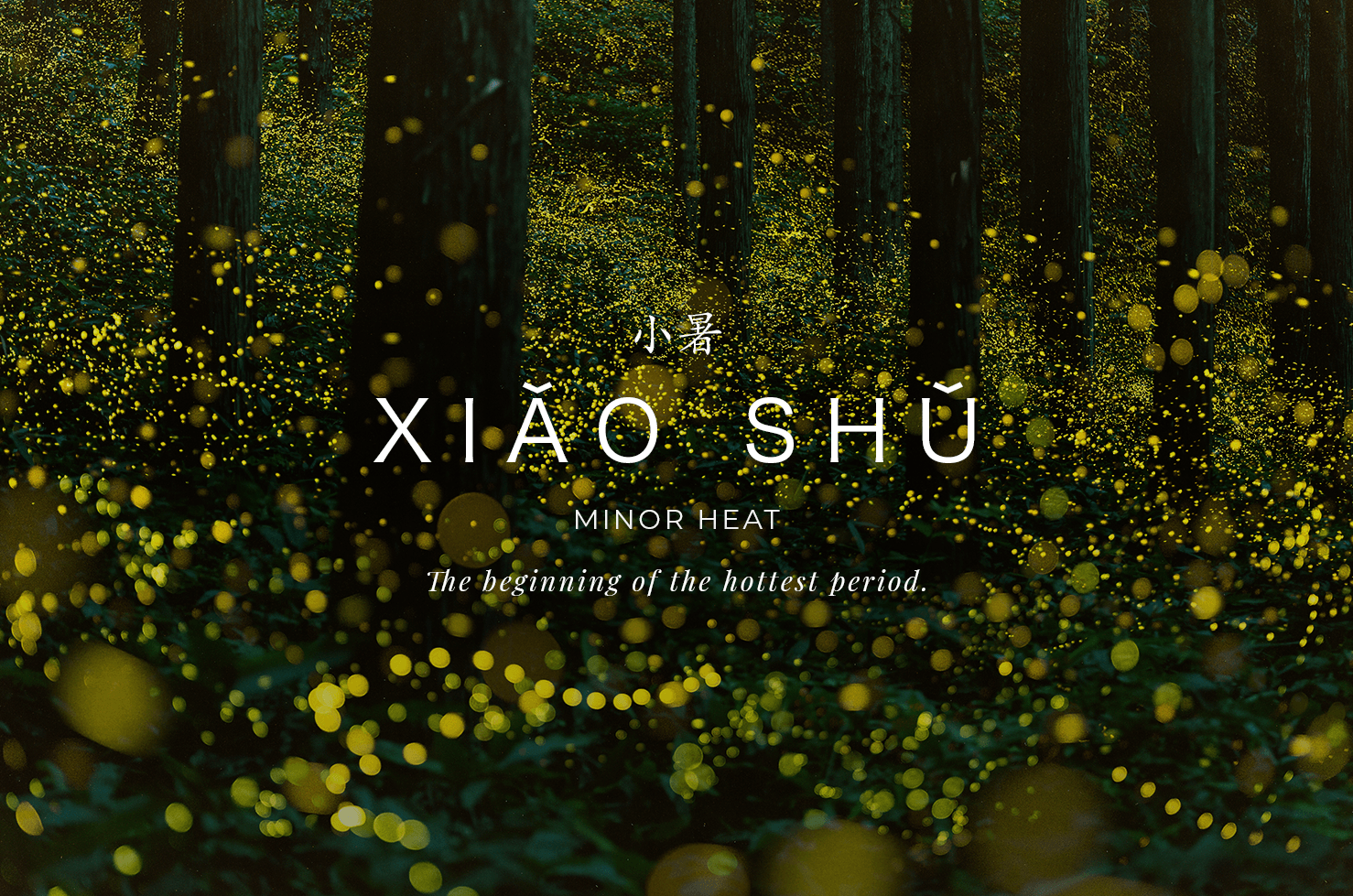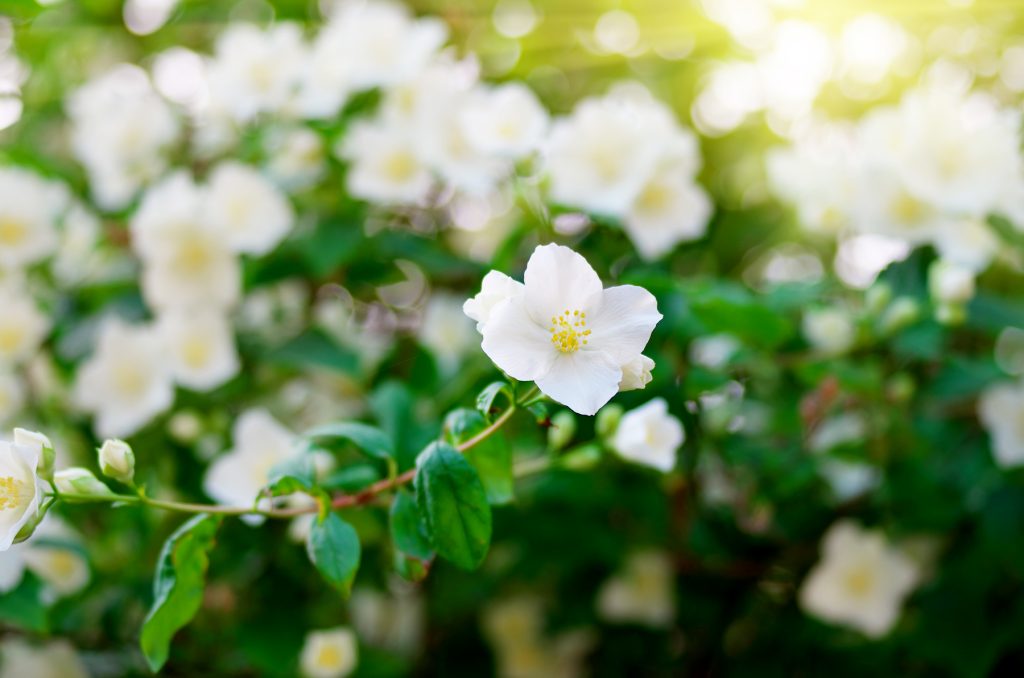Dà Shǔ: Major Heat
大暑 Dà Shǔ: Major Heat
大暑 Dà Shǔ, translated as Major Heat, is the 12th solar term in the Ancient Chinese Solar Calendar and the 6th and final term of the summer season. This year it starts on July 23rd and continues through August 6th. 大暑 Dà Shǔ, or Major Heat begins when the Sun reaches the celestial longitude of 120° and ends when it reaches the longitude of 135°.
Let’s look at the meaning of大暑 Dà Shǔ:
大 Dà: major, great
暑Shu: heat, boiling
大暑 Dà Shǔ is that it announces the beginning of the hottest period of the year. Outside temperatures become scorching hot and the heat climbs to its peak.
High humidity levels and sweltering fireiness bring about monsoons and severe thunderstorms which cause floods and landslides in many parts of China.
Farmers continue protecting their fields from potential floods and droughts. Depending on the geographical region, the weather can turn from one extreme to another in a blink of an eye.
Each of the 24 solar terms is further divided into 3 pentads. The three pentads of大暑 Dà Shǔ, or Major Heat are as follows:
1st pentad –腐草为萤fireflies appear at night
2nd pentad –土润溽暑weather is hot and humid
3rd pentad –大雨时行thunderstorms occur frequently
The 三伏 San Fu Philosophy
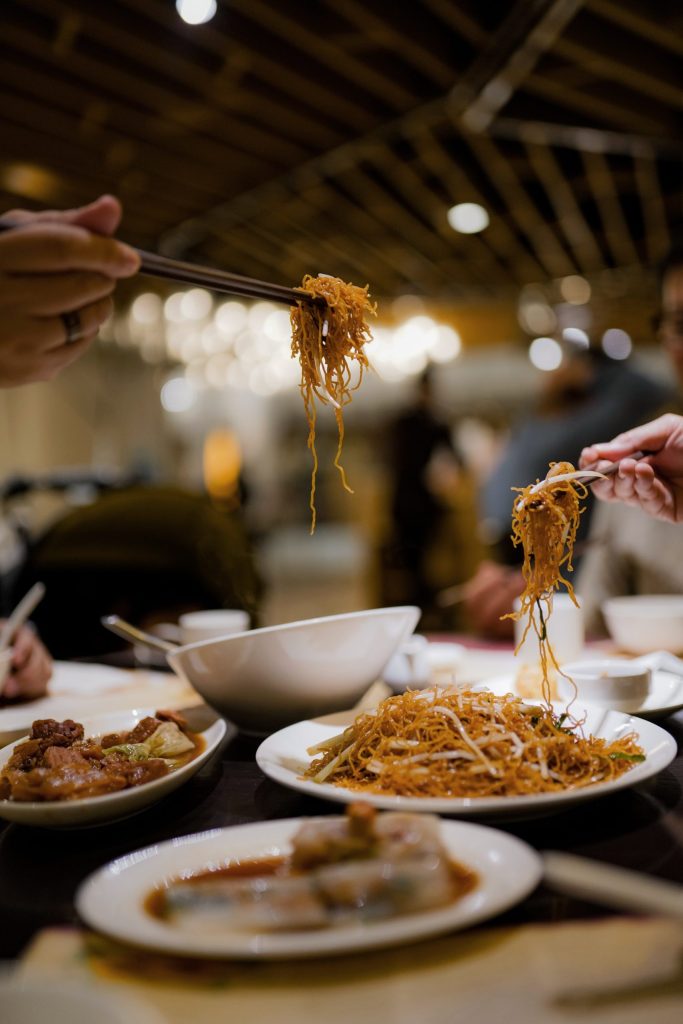
In our previous blog on 小暑 Xiǎo Shǔ, known as Minor Heat, we briefly mentioned the 三伏 San Fu philosophy. As a quick reminder, Fu in Chinese means to lurk, hide or lay down and it is customary in China to lie down during the heat of a summer day.
The 三伏 San Fu philosophy is practiced by the Chinese people during the 大暑 Dà Shǔ as well. This custom dates back to as early as the Qin Dynasty (221 B.C. – 207 B.C.).
Furthermore, ancient texts from the Han Dynasty (202 B.C. – 220 A.D.) depict 三伏 San Fu celebrations in which the Chinese people immersed themselves in feasting and drinking together.
During this time ice had already gained popularity in ancient China and was in high demand on hot summer days by those members of the society who could afford it. Some historical records describe huge ice cubes delivered to the imperial consort Yang Yuhuan of the Tang Dynasty (618 – 907 A.D.) to be placed around the banquet and used as air conditioners.
The emperors of both the Tang (618 – 907 A.D.) and Song (960 – 1279 A.D.) Dynasties had ice delivered to all the court officials during the 三伏 San Fu period.
In summer a calm heart keeps you cool. – Ancient Chinese Proverb
Since ancient times the Chinese people have believed that peace of mind can help keep their body cool.
There are numerous traditional practices used when there is a need to adjust the mind and body in both external and internal environments. Maintaining balance which leads to harmony is always key.
Traditional Chinese Food Therapy
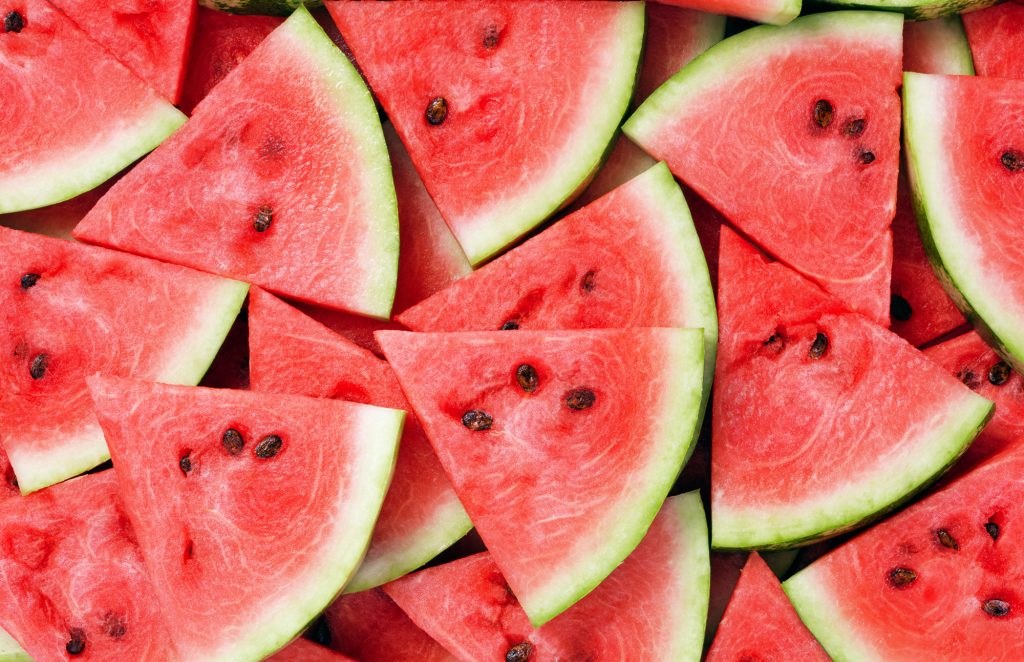
Food therapy also plays an important role in the Chinese culture as food is considered medicine.
All substances that contain Qi provide food and thereby preserve life. And yet, eating them unaware can mean success or failure. To secure the body at the root, you must provide it with food. A person who does not know the appropriateness of food is unable to preserve life.
– 孙思邈Sun Simiao, legendary Chinese physician (7th century)
And so, 大暑 Dà Shǔ, is known for certain foods that are traditionally consumed during this time of year. Food items which have high water content are recommended because they help replenish body fluids lost from sweating.
Watermelon is king of 大暑 Dà Shǔ. Pineapples are a fruit of choice in Southern China. Lychee is another fruit which is traditional food during the Major Heat solar term.
Eating Xiancao (grass jelly) during Major Heat makes life as youthful and energetic as the immortals – ancient Chinese wisdom
Another food that is traditional during hot summer days is mung bean soup. It is customary to offer large pots of cooked mung bean soup or herbal drinks with disposable cups and utensils in front of herbacies, temples and even large office buildings in major Chinese cities during Major Heat for citizens to enjoy and cool their bodies down at no cost.
And last but not least, sour plum juice, which is loved by the Chinese for its refreshing and cooling properties on the sizzling sauna-like days.
Daoyin Practices
Breath work is another practice favored by the Chinese on hot summer days and even prescribed by doctors. Daoyin and the Way of Softness & Harmonizing Your Training requires a minimal amount of movement and offers maximum results. Not only do such practices lead to internal peace and a calm emotional state, but they also adjust body temperature to the outside environment. And therefore, this form of exercise is great during 大暑 Dà Shǔ.
May you continue to balance and harmonize yourself as we transition into大暑 Dà Shǔ, or Major Heat. Stay cool and enjoy the journey!
Additional Resources
Looking for more information on this time of the year? Try these resources below, and enjoy!
Don’t forget to check out the newest videos on our YouTube Channel
Jammin’ With Jiao Shi
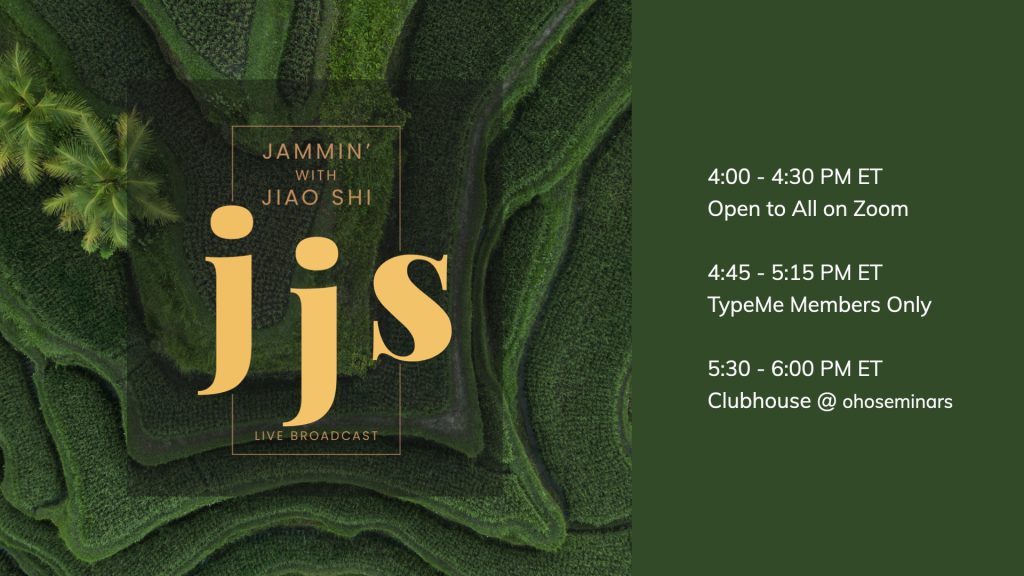
And join us for Jammin’ with Jiao Shi, this Saturday at 4:00pm ET for ALL, 4:45pm ET for TypeMe Community Members, and 5:30pm ET on Clubhouse @ohoseminars. See you there!
大暑 Dà Shǔ, translated as Major Heat, is the 12th solar term in the Ancient Chinese Solar Calendar and the 6th and final term of the summer season. This year it starts on July 23rd and continues through August 6th. 大暑 Dà Shǔ, or Major Heat begins when the Sun reaches the celestial longitude of 120° and ends when it reaches the longitude of 135°.
Let’s look at the meaning of大暑 Dà Shǔ:
大 Dà: major, great
暑Shu: heat, boiling
大暑 Dà Shǔ is that it announces the beginning of the hottest period of the year. Outside temperatures become scorching hot and the heat climbs to its peak.
High humidity levels and sweltering fireiness bring about monsoons and severe thunderstorms which cause floods and landslides in many parts of China.
Farmers continue protecting their fields from potential floods and droughts. Depending on the geographical region, the weather can turn from one extreme to another in a blink of an eye.
Each of the 24 solar terms is further divided into 3 pentads. The three pentads of大暑 Dà Shǔ, or Major Heat are as follows:
1st pentad –腐草为萤fireflies appear at night
2nd pentad –土润溽暑weather is hot and humid
3rd pentad –大雨时行thunderstorms occur frequently
[/vc_column_text]
The 三伏 San Fu Philosophy

In our previous blog on 小暑 Xiǎo Shǔ, known as Minor Heat, we briefly mentioned the 三伏 San Fu philosophy. As a quick reminder, Fu in Chinese means to lurk, hide or lay down and it is customary in China to lie down during the heat of a summer day.
The 三伏 San Fu philosophy is practiced by the Chinese people during the 大暑 Dà Shǔ as well. This custom dates back to as early as the Qin Dynasty (221 B.C. – 207 B.C.).
Furthermore, ancient texts from the Han Dynasty (202 B.C. – 220 A.D.) depict 三伏 San Fu celebrations in which the Chinese people immersed themselves in feasting and drinking together.
During this time ice had already gained popularity in ancient China and was in high demand on hot summer days by those members of the society who could afford it. Some historical records describe huge ice cubes delivered to the imperial consort Yang Yuhuan of the Tang Dynasty (618 – 907 A.D.) to be placed around the banquet and used as air conditioners.
The emperors of both the Tang (618 – 907 A.D.) and Song (960 – 1279 A.D.) Dynasties had ice delivered to all the court officials during the 三伏 San Fu period.
In summer a calm heart keeps you cool. – Ancient Chinese Proverb
Since ancient times the Chinese people have believed that peace of mind can help keep their body cool.
There are numerous traditional practices used when there is a need to adjust the mind and body in both external and internal environments. Maintaining balance which leads to harmony is always key.
Traditional Chinese Food Therapy

Food therapy also plays an important role in the Chinese culture as food is considered medicine.
All substances that contain Qi provide food and thereby preserve life. And yet, eating them unaware can mean success or failure. To secure the body at the root, you must provide it with food. A person who does not know the appropriateness of food is unable to preserve life.
– 孙思邈Sun Simiao, legendary Chinese physician (7th century)
And so, 大暑 Dà Shǔ, is known for certain foods that are traditionally consumed during this time of year. Food items which have high water content are recommended because they help replenish body fluids lost from sweating.
Watermelon is king of 大暑 Dà Shǔ. Pineapples are a fruit of choice in Southern China. Lychee is another fruit which is traditional food during the Major Heat solar term.
Eating Xiancao (grass jelly) during Major Heat makes life as youthful and energetic as the immortals – ancient Chinese wisdom
Another food that is traditional during hot summer days is mung bean soup. It is customary to offer large pots of cooked mung bean soup or herbal drinks with disposable cups and utensils in front of herbacies, temples and even large office buildings in major Chinese cities during Major Heat for citizens to enjoy and cool their bodies down at no cost.
And last but not least, sour plum juice, which is loved by the Chinese for its refreshing and cooling properties on the sizzling sauna-like days.
Daoyin Practices
Breath work is another practice favored by the Chinese on hot summer days and even prescribed by doctors. Daoyin and the Way of Softness & Harmonizing Your Training requires a minimal amount of movement and offers maximum results. Not only do such practices lead to internal peace and a calm emotional state, but they also adjust body temperature to the outside environment. And therefore, this form of exercise is great during 大暑 Dà Shǔ.
May you continue to balance and harmonize yourself as we transition into大暑 Dà Shǔ, or Major Heat. Stay cool and enjoy the journey!
Additional Resources
Looking for more information on this time of the year? Try these resources below, and enjoy!
Don’t forget to check out the newest videos on our YouTube Channel
Jammin’ With Jiao Shi


